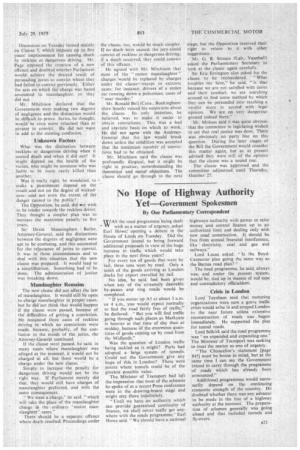No Hope of Highway Authority
Page 59

If you've noticed an error in this article please click here to report it so we can fix it.
Yet—Government Spokesmen By Our Parliamentary Correspondent \VAS the road programme being dealt with as a matter of urgency, asked Earl Howe; opening a debate in the House of Lords on Tuesday. Did the Government intend to bring forward additional proposals in view of the huge increase in traffic which would take place in the next three years?
For every ton of goods that went by rail, three tons went by road. Only a tenth of the goods arriving at London docks for export travelled by rail.
No idea, he said, had been given when any of the extremely desirable by-passes and ring roads would be completed.
"if you motor up AS at about 3 a.m. or 4 a.m., you would expect normally to find the road fairly free of traffic," he declared. "But you will find traffic going through such places as Markyate is heavier at that time of day than at midday, because of the enormous quantities of goods coming up by road from the Midlands."
Was the question of London traffic -being tackled as it might? Paris had adopted a large system of tunnels. Could not the Government give any hope of this in London? There were points where tunnels could be of the greatest possible value.
The Minister of Transport had left the impression that most of the schemes he spoke of at a recent Press conference were in the drawing-board stage and might stay there indefinitely.
Until we have an authority which can provide guaranteed continuity of finance, we shall never really get anywhere with the roads programme," Earl Howe said. "We should have a national highways authority with power to raise money and control finance up to an authorized limit and dealing only with new road construction. It should be free from annual financial interference, like electricity, coal and gas and railways."
Lord Lucas asked: "Is the BoydCarpenter plan going the same way as the Barnes road plan? r The road programme, he said, always was, and under the present system, would be, tied up in masses of red tape and contradictory officialdom.
Crisis in London
Lord Teynham said that motoring organizations were sure a grave traffic crisis would arise in and aroand London iq the near future unless extensive reconstruction of roads was begun immediately. He supported the plea for tunnel roads.
Lord Selkirk said the road programme was "an expanded and expanding one." The Minister of Transport was seeking to treat the matter as one of urgency.
"The Chancellor's statement [page 845] must be borne in mind, but at the same time I can say the Government intend to carry through the programme of roads which has already been announced."
Additional programmes would necessarily depend on the continuing economic strength of the country. He doubted whether there was any advance to be made in the line of a highway authority at the moment. The preparation of schemes generally was going ahead and that included tunnels and fly-overs.
































































































